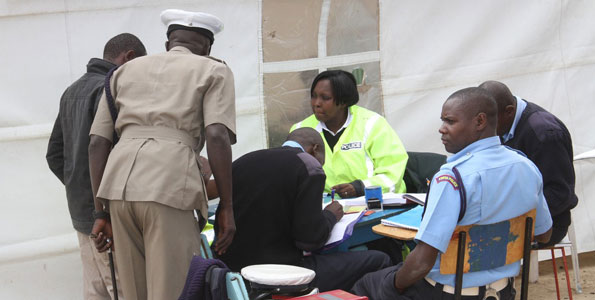App Shows Drivers How to Beat #NairobiTriffic
To describe traffic in Nairobi as a nightmare is an understatement....

Kenya’s new system of mobile traffic courts, in which magistrates deliberate and penalise law-breaking motorists from roadside tents, is reducing the number of vehicular accidents nationwide, according to Traffic Police Commandant Samuel Kimaru.
Since the programme was launched August 22nd, police officers have been pulling over drivers suspected of speeding or recklessness and inspecting vehicles at checkpoints, while magistrates hear cases in makeshift courtrooms within close proximity.
The mobile traffic courts are part of the government’s “Safety First” campaign to lower the rate of traffic-related deaths in Kenya.
“We have not carried out a quantitative survey yet, but by my rough estimate, the accidents have been reduced by 50%,” Kimaru told Sabahi.
Traffic police statistics show that an average of 3,000 Kenyans die annually in crashes and other road accidents, Kimaru said.
According to Kenya’s Ministry of Transport and Infrastructure, from January to mid-July, 1,725 Kenyans died in road accidents — 796 pedestrians, 442 passengers, 170 motorcyclists, 161 drivers, 77 pedal cyclists and 79 bicycle passengers.
“Since we started [the programme] three weeks ago, we are seeing some consciousness on the part of motorists on the manner in which they are using our roads,” Kimaru said, adding that the operation will soon be expanded.
However, Kimaru and other police officials came under fire after a bus crash in Narok killed at least 41 people in late August.
The Law Society of Kenya blasted Kimaru for failure to enforce traffic laws and gave him until the end of September to come up with “a credible and convincing work plan” to improve road safety.
Kimaru acknowledges that there are some chinks in the new system.
Some motorists are evading the law by taking detours when they find out the police have set up checkpoints along their routes, he said.
“We are working on modalities on how every police officer in the country will be used to enforce traffic laws,” he said. “So, as we increase our capacity to be able to handle this issue effectively, [we make] it difficult for operators to evade our dragnets.”
Security officials are impounding vehicles found to have safety violations and issuing tickets to motorists who speed or drive without a licence.
First-time violators are ordered to pay a fine, while those with previous infractions are taken to jail, Kimaru said. Passengers who fail to use seatbelts also are subject to fines and, in cases where the vehicle has no seatbelts, the owner is charged as well.
Fines for various traffic violations can range from 10,000 ($114) to 50,000 shillings ($571), according to Kimaru.
The mobile courts are also working to eradicate bribery and police corruption, according to Police Inspector General David Kimaiyo.
Commission officers go undercover in the mobile courts system to ensure that government employees do not take bribes, he told Sabahi.
“We have so far re-shuffled nine commanders and over 200 others will be affected,” Kimaiyo said. “For those who have been dogged by graft allegations, we have officers from the Ethics and Anti-Corruption Commission investigating them. If found guilty, we will sack them and let them face the law.”
Nairobi street vendor Simon Ayuma, 32, welcomed the roadside traffic courts.
“This is a great idea that will help remove crazy drivers and defective vehicles from our roads,” he said. “These ruthless drivers have made us lose our relatives, [but] through such initiatives, the safety of our roads can be guaranteed.”
Yet more needs to be done to stop the high rate of traffic accidents, such as building better roads and installing signs, said Samuel Mutiso, 50, a high school teacher in Nairobi.
“We should also install cameras on all the major roads so that violators of traffic rules can be captured at any time and be prosecuted,” he said.